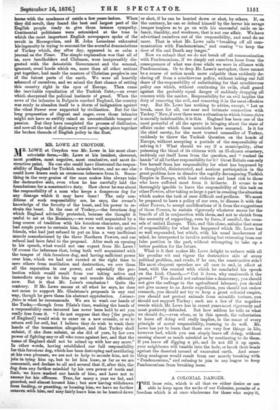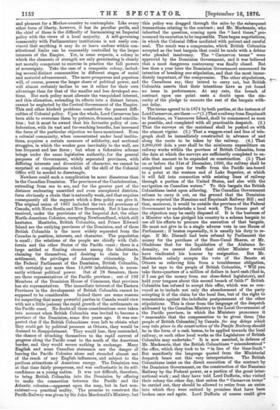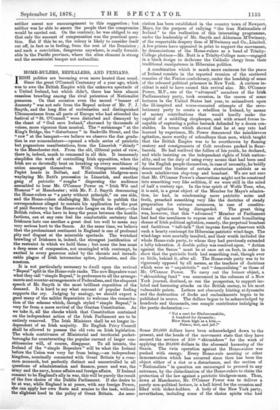A COLONIAL DANGER.
THE loose rein, which is all that we either desire or are able to keep upon the necks of our Colonies, permits of a freedom which is at once wholesome for those who enjoy it, and pleasant for a Mother-country to contemplate. Like every other form of liberty, however, it has its peculiar perils, and the chief of these is the difficulty of harmonising an Imperial policy with the views of a local majority. A self-governing community with Parliamentary institutions is not easily con- vinced that anything it may do or leave undone within con- stitutional limits can be reasonably controlled by the larger interests of the Empire. Yet, in some respects, a colony in which the elements of strength are only germinating is clearly not morally competent to exercise in practice the full powers of sovereignty. Take the case of a composite colony, includ- ing several distinct communities in different stages of social and material advancement. The more prosperous and populous will, of course, possess the larger share of political power, and will almost certainly incline to use it rather for their own advantage than for that of the smaller and less developed sec- tions. But such policy must alienate the vanquished interest, and this alienation, extending its effects into a distant future, cannot be neglected by the Central Government of the Empire. This and other kindred problems constitute the present diffi- culties of Colonial policy. Upon the whole, Lord Carnarvon has been able to overcome them by patience, firmness, and conciila- tion ; but it must be owned that his favourite policy of con- federation, with its vast and far-reaching benefits, has increased the force of the particular objection we have mentioned. Even a colonial community, when concentrated under local institu- tions, acquires a certain measure of solidarity, and sectional struggles, in which the weaker goes inevitably to the wall, are less frequent and less fierce ; but when a federative scheme brings under the same legislative authority, for the general purposes of Government, widely separated provinces, with differing interests and diversities of character, we cannot be surprised at complications which all the skill of the Colonial Office will be needed to disentangle.
Nowhere could such a complication be more disastrous than in the Canadian Dominion. The provinces of the Confederation, extending from sea to sea, and for the greater part of the distance embracing unsettled and even unexplored districts. form obviously a chain that is naturally weak, and that requires consequently all the support which a firm policy can give it. The original union of 1867 included the two old provinces of Canada, with Nova Scotia and New Brunswick. But it has since received, under the provisions of the Imperial Act, the other North-American Colonies, excepting Newfoundland, which still hesitates. Manitoba, British Columbia, and Prince Edward Island are the outlying provinces of the Dominion, and of these British Columbia is the most widely separated from the Canadas in position, interests, and character. The population is small ; the relations of the people are chiefly with Cali- fornia and the other States of the Pacific coast ; there is a large settled or floating element among the inhabitants, claiming for themselves, and desiring to claim for the settlement, the privileges of American citizenship. In the Federal Parliament of the Dominion, British Columbia, with certainly not more than 15,000 inhabitants, is neces- sarily without political power. Out of 78 Senators, there are three representatives of the Pacific province ; out of 192 Members of the Dominion House of Commons, that province has six representatives. The immediate interest of the Eastern Provinces in the development of British Columbia cannot be supposed to be considerable. Indeed there are some reasons for suspecting that many powerful parties in Canada would view with not a little jealousy the rapid growth of the settlements on the Pacific coast. No doubt all these considerations were taken into account when British Columbia was invited to become a province of the Dominion, some five years ago. It was sus- pected that if the British Columbians were left to obtain what they could get by political pressure at Ottawa, they would be doomed to disappointment. They would lose, they contended, the chance of attaching themselves to the rapid current of progress along the Pacific coast to the south of the American border, and they would secure nothing in exchange. Many English and some Canadian statesmen saw the danger of leaving the Pacific Colonies alone and stranded almost out of the reach of any English influences, and subject to the perilous attractions of American energy. The Dominion was at that time fairly prosperous, and was enthusiastic in its self- confidence as a young nation. It was not difficult, therefore, to bring British Columbia into the Dominion by offering to make the connection between the Pacific and the Atlantic colonies—apparent upon the map, but in fact non- existent—a practical reality. The promise to construct the Pacific Railway was given by Sir John Macdonald's Ministry, but this policy was dragged through the mire by the subsequent transactions relating to the contract ; and Mr. Mackenzie, who inherited the question, coming upon the "hard times," pro- nounced its execution to be impossible. Then began negotiations, in which the Colonial Office mediated with patient and careful zeal. The result was a compromise, which British Columbia accepted as the best bargain that could be made with a debtor who pleaded insolvency. The " Carnarvon terms" were approved by the Dominion Government, and it was believed that a most dangerous controversy was finally closed. But less than a year later the Dominion Government announced its intention of breaking one stipulation, and that the most imme- diately important, of the compromise. The other stipulations, the Canadians say, they intend to carry out, but British Columbia asserts that their intentions have as yet found no issue in performance. At any rate, the breach of contract upon one point casts a doubt upon the sin- cerity of the pledge to execute the rest of the bargain with- out delay. The terms agreed to in 18.74 by both parties, at the instance of Lord Camarvon, are these :—" (1.) That a railway from Esquiraalt to Nanaimo, on Vancouver Island, shall be commenced as soon as possible, and completed with all practicable despatch. (2.) That the surveys on the mainland shall be pushed on with the utmost vigour. (3.) That a waggon-road and line of tele- graph shall be immediately constructed in advance of and along the route to be taken by the railway. (4.) That 2,000,000 dols, a year shall be the minimum expenditure on railway works within the province of British Columbia, from the date at which the surveys are sufficiently completed to en- able that amount to be expended on construction. (5.) That on or before the 31st of December, 1890, the railway shall be completed and open for traffic from the Pacific sea-board to a point at the western end of Lake Superior, at which it will fall into connection with existing lines of railway through a portion of the United States, and also with the navigation on Canadian waters." To this bargain the British Columbians insist upon adhering. The Canadian Government refuses to carry it out, on the ground that the Dominion Senate rejected the Nanaimo and Esquimalt Railway Bill ; and that, moreover, it would be outside the province of the Federal Government to undertake a local work. The former part of the objection may be easily disposed of. It is the business of a Minister who has pledged his country to a solemn bargain to use all his efforts to procure the execution of that bargain. He must not give in to a single adverse vote in one House of Parliament ; if beaten repeatedly, it is usually his duty to re- sign. If Mr. Disraeli had been refused by Parliament the money for the purchase of the Suez-Canal Shares, or Mr. Gladstone that for the liquidation of the Alabama In- demnity, we cannot doubt that either Minister would have vindicated his honour by resignation. But Mr. Mackenzie calmly accepts the vote of the Senate at Ottawa as relieving him from a troublesome obligation, and he says to the people of British Columbia, "Will you take three-quarters of a million of dollars in hard cash (that is, if I can get the money from our close-fisted legislators), and hold your tongues about this second breach of faith ?" British Columbia has refused to accept this offer, which was so con- veyed as to include not only the abandonment of the party accepting it of the claim for the local line, but of the right to remonstrate against the indefinite postponement of the other stipulations. This is clear from the language of the despatch addressed by the Canadian Ministry to the Local Government of the Pacific province, in which the Ministers pronounce it "reasonable that the compensation to be given them [the people of British Columbia] by Canada for any delays which may take place in the construction of the Pacific Railway should be in the form of a cash bonus, to be applied towards the local railway, or such other local works as the Legislature of British Columbia may undertake." It is now asserted, in defence of Mr. Mackenzie, that the British Columbiana " misunderstood " the offer, which they took to be "in lieu of the time-limit." But manifestly the language quoted from the Ministerial despatch bears out this very interpretation. The British Columbiana insist on the direct execution of the contract by the Dominion Government, on the construction of the Nanaimo Railway by the Federal power, as a portion of the great inter- national work ; and they have told Lord Dufferin, who visited their colony the other day, that unless the " Carnarvon terms" be carried out, they should be allowed to retire from an union into which they were enticed by promises that have been broken once and again. Lord Dufferin of course could give
neither assent nor encouragement to this suggestion ; but neither was he able to assure the people that the compromise would be carried out. On the contrary, he was obliged to say that only the amount of compensation was the practical ques- tion. But if this be so, the colony is likely to consider itself cut off, in fact as in feeling, from the rest of the Dominion ; and such a conviction, dangerous anywhere, is really formid- able in the Pacific province, where the alien element is strong and the secessionist temper not unfamiliar.
































 Previous page
Previous page